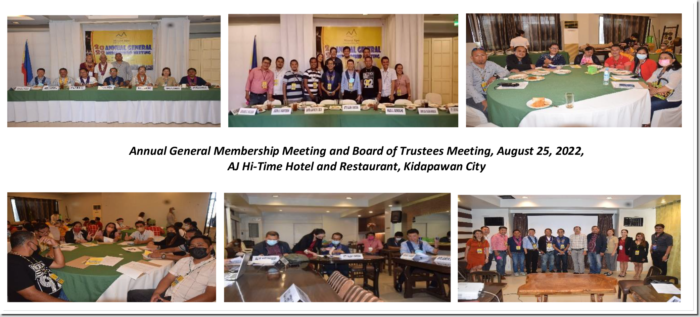



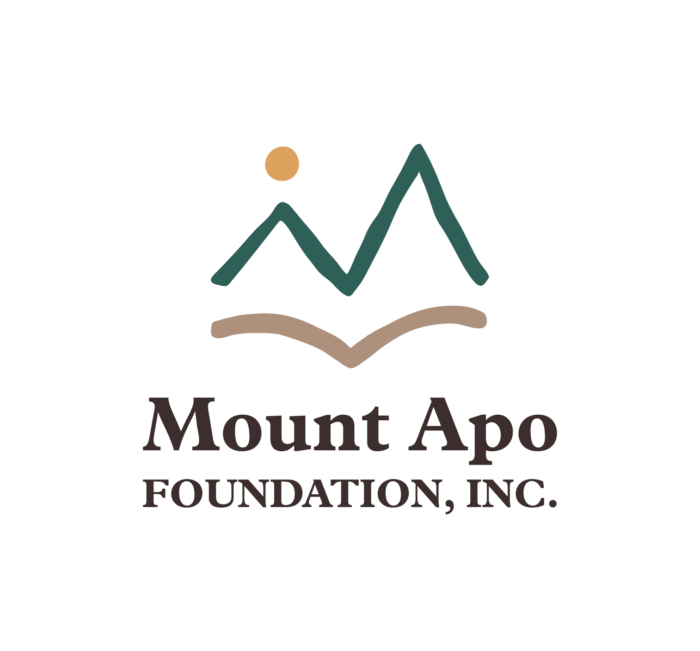
The operations of Mount Apo Foundation in 2022 turned out to be a fruitful one after experiencing the challenges of COVID-19 in prior years. In the midst of the decreasing support from the Energy Development Corporation (EDC) given through the Environmental Tribal Welfare Trust Fund (ETWF) due to the variable production of the Mt. Apo Geothermal Project, as well as the increasing demand for community service, MAFI endeavored to intensify its resource mobilization program as it continued its three programs, with narrowed scales and targets on scholarship, community and environment and cultural heritage activities.
Resource Mobilization Program
Starting 2019, ensuing the institutional program review and strategic planning processes in 2018, the foundation has been prompted to take bolder steps in raising additional funds from external sources in addition to EDC’s ETWTF in order to support the three programs more sustainably.
August 2022 marked a milestone for MAFI as it luckily received a grant, among 13 civil society organizations in the Philippines, amounting to Php15,998,592.00 from the United States Agency for International Development (USAID) through its managing organization, the Gerry Roxas Foundation. Under the Investing in Sustainability and Partnerships for Inclusive Growth and Regenerative Ecosystems (INSPIRE) Project, MAFI’s three-year project is entitled, “Posokaddoy: Empowering Indigenous Communities Toward Integrated Biodiversity Conservation and Sustainable Landscapes in Central Pantaron Range”. The geographical scope of the Central Pantaron Range are the two key biodiversity areas (KBAs), namely, Mt. Apo Natural Park consisting of the municipalities of Magpet and Makilala and the city of Kidapawan, and Mt. Mahuson in the municipality of Arakan, all in North Cotabato.
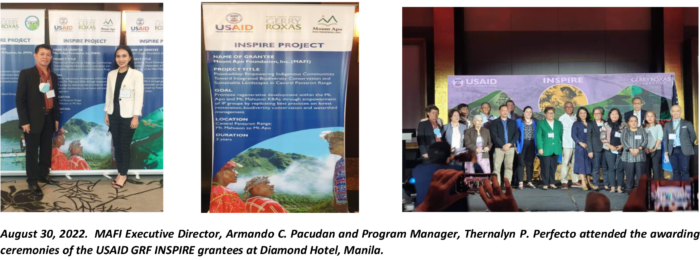
Posokaddoy, a Manobo term for “unity” or “unification”, aims to promote regenerative development within the Mt. Apo and Mt. Mahuson KBAs by empowering various IP groups within their respective ancestral domains. It intends to replicate the best practices of forest restoration, biodiversity conservation, watershed management and IP empowerment done by MAFI and EDC with the Cotabato Tribal Consultative Council for Development, Inc. (CTCCDI). Specifically, the project embarks on four strategic approaches, namely: 1) cultural empowerment, 2) forest restoration and biodiversity conservation, 3) biodiversity-friendly and culture-based livelihood/social enterprises, and 4) IEC/advocacy support.The Indigenous Cultural Communities/Indigenous Peoples (ICC/IPs) that will benefit from the project are the following CADTs:
The co-implementing partners of the Posokaddoy project are the EDC-Mt. Apo Corporate Relations Department as the private sector partner, and the CTCCDI, an IP organization based in Kidapawan City. The former provides technical assistance, while the latter assists in cultural/community interventions.
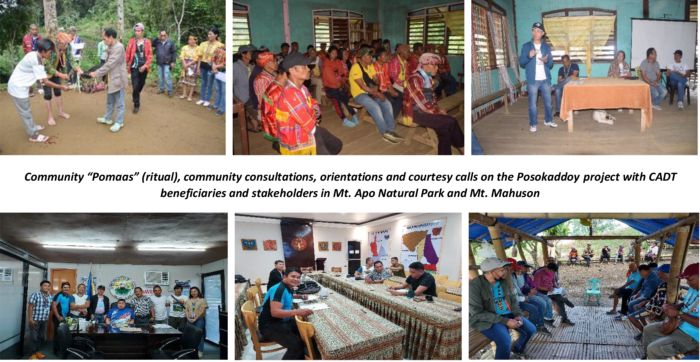
Educational Development Program
As MAFI’s flagship program for almost three decades now, EDP continues to provide scholarships to both Senior High School (SHS) and Collegiate poor but deserving students from the IP’s (80%) and non-IP upland dwellers (20%).
For SY 2021-2022, MAFI maintained 22 scholars (10 SHS, 12 collegiate). The foundation is also proud to have high passing rate for its scholar-alumni who took their respective licensure examinations where 14 out of 15 licensure examinees (or 93%) made it to their respective examinations. Breakdown in terms of courses/type of examinations is as follows: 86% (12 scholars) passed the Licensure Examination for Teachers (LET); 8.3% (1 scholar) made it to the Criminologist Licensure Examination (CLE) while another 8.3% (1 scholar) hurdled the Fire Officer Examination (FOE).
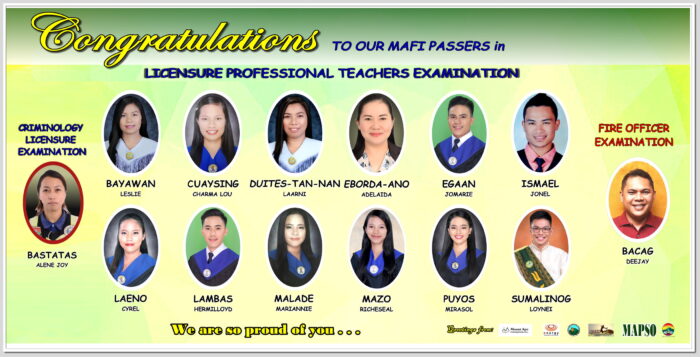
MAFI scholar-alumni passers of the licensure examinations administered in 2022
MAFI’s support is also extended for the strengthening of the scholars, alumni and parents’ organizations. For 2022, the following activities were undertaken:


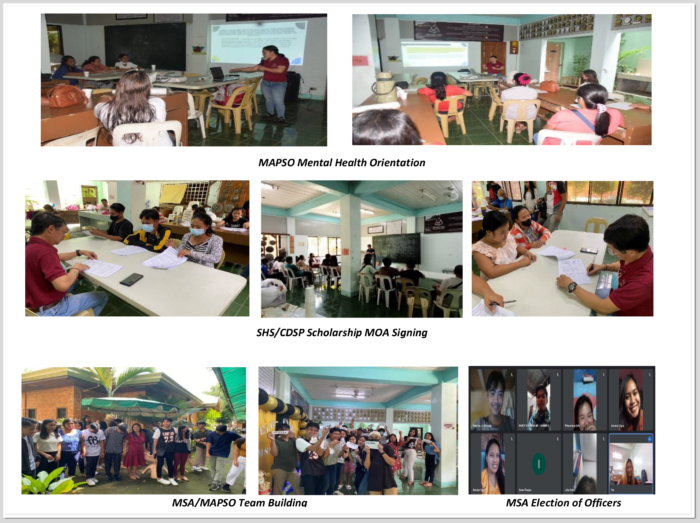
Community and Environment Program
For almost three decades now, MAFI has been committed to help protect the environment in the Mt. Apo Natural Park and to ensure the engagement of the community in doing sustainable environmental initiatives. Through its environmental advocacy, direct on-the-ground implementation and partnerships with the government agencies, LGUs, CSOs and other stakeholders, major accomplishments during the year are as follows:
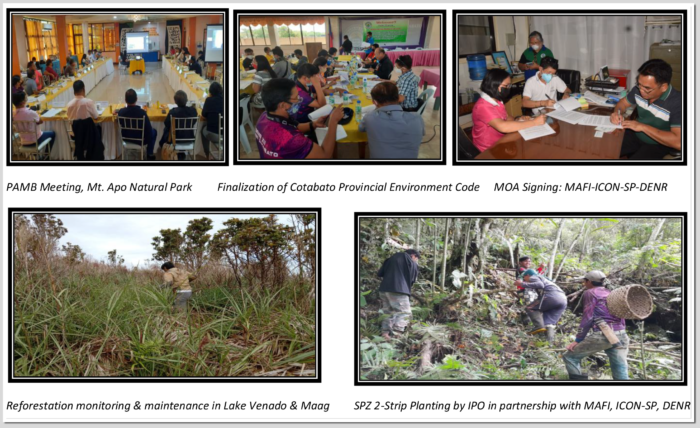
Cultural Heritage Program
In its commitment to empower, strengthen and provide support to the tribal communities in the area of responsibility, MAFI has provided the following assistance in 2022:
With the approval and implementation of the Posokaddoy Project funded by the USAID through GRF for the Central Pantaron Range, cultural empowerment activities became an integral part of the Cultural Heritage Program in 2022 and in the next three years. Two of these are the establishment and maintenance of School of Indigenous Knowledge (IKS) in the four (4) CADT areas within Mt. Apo Natural Park and Mt. Mahuson and the formulation and/or review of the Indigenous Political Structure (IPS) of the tribes.
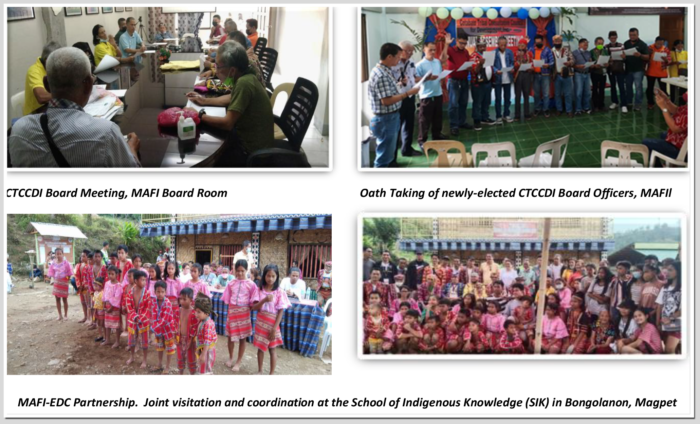
Institutional and Governance Activities
In its continuing effort to sustain good governance, MAFI has finally found its way to conduct its Annual General Membership Meeting face-to-face on August 25, 2022 after it was postponed for two years at the height of COVID-19 pandemic. Some 60 members of the GA excitedly came, interacted with colleagues, and listened to the two-year institutional reports and updates of the foundation. New members of the Board of Trustees were elected, while new members of the General Assembly were accepted. More importantly, to learn the status and performance of MAFI as well as to make operational decisions and approvals, regular BOT meetings were conducted during the year. In terms of human resource complement, three project-based staff were hired to assist in implementing the USAID/GRF-funded project while three regular employees decided to move to another job ventures.
